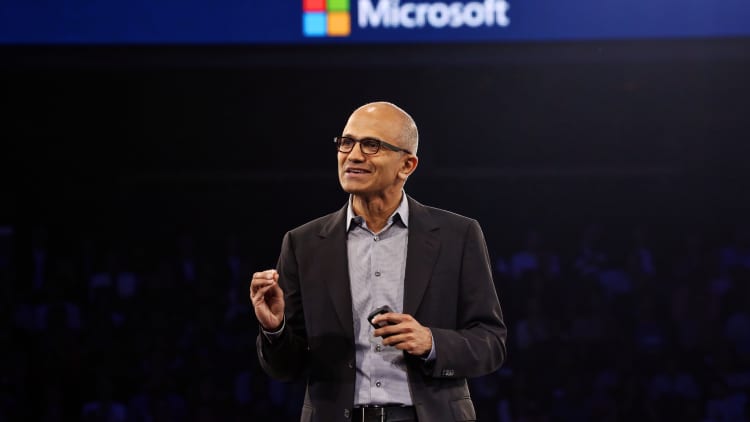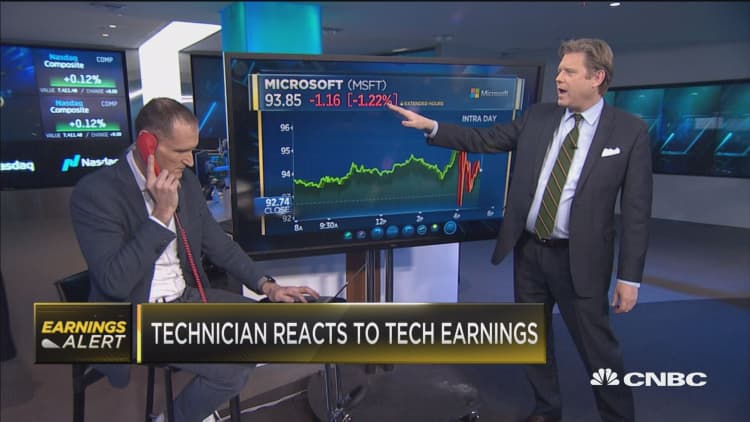
Microsoft stock fell by more than 2 percent immediately after the company reported better-than-expected earnings for the second quarter of its 2018 fiscal year -- which ended on December 31 -- after the bell on Wednesday. After the company's conference call with analysts, the stock was trading about 0.3 percent above the $95.01 closing price.
- Earnings: 96 cents per share, vs. 86 cents per share as expected by analysts, according to Thomson Reuters.
- Revenue: $28.92 billion, vs. $28.40 billion as expected by analysts, according to Thomson Reuters.
There was a $13.8 billion one-time accounting charge for Microsoft in the quarter as a result of recent changes to the U.S. tax code.
But overall, Microsoft's revenue was up 12 percent year over year, according to Wednesday's earnings statement. Microsoft's biggest business segment, More Personal Computing, which includes Windows, devices, gaming and search advertising, grew 2 percent, with $12.17 billion in revenue. That's above the FactSet consensus estimate of $12.02 billion in revenue for More Personal Computing.
Gaming revenue for the quarter was up 8 percent, thanks to the new availability of Microsoft's Xbox One X gaming console.
The Productivity and Business Processes segment, including Office, Dynamics and LinkedIn, increased by 25 percent with revenue of $8.95 billion, above the $8.86 billion FactSet estimate. And the Intelligent Cloud business, which contains Azure, Windows Server and SQL Server, produced $7.80 billion in revenue, giving it a 15 percent growth rate. That's above FactSet's $7.51 billion estimate for the segment.
In Wednesday's statement Microsoft, as usual, didn't specify how much revenue Azure brought in, but it did provide a growth rate. Azure's revenue was up by 98 percent in the quarter, and compute usage more than doubled. In the quarter Microsoft's Azure public cloud gained share from market leader Amazon Web Services, KeyBanc analysts estimated earlier this month.
Microsoft expects to have $25.25-25.95 billion in revenue in its fiscal third quarter, and that midpoint is just a bit higher than the Thomson Reuters analyst estimate.
And tax changes should result in a 16 percent effective tax rate, plus or minus 2 percent, in the fiscal second half of 2018, CFO Amy Hood said on Wednesday's conference call. In Microsoft's fiscal first quarter, the rate was 18 percent. The company expects to have an effective tax rate "slightly below" the new 21 percent corporate rate in its 2019 fiscal year, Hood said. In the weeks leading up to the earnings report, some analysts were suggesting that decreases in the effective tax rate could lead to gains in Microsoft's earnings per share.
In a Jan. 28 note the KeyBanc analysts said they were expecting Microsoft to report a $21.8 billion annualized revenue run rate -- the final month of the quarter, multiplied by 12 -- for Commercial Cloud, which includes Azure, Office 365 and Dynamics 365, which would imply 50 percent growth. For the second quarter Microsoft did not report annualized revenue run rate for commercial cloud.
But Microsoft did say that in the fiscal second quarter it picked up commercial cloud revenue totaling $5.3 billion, which was up 56 percent year over year, and up sequentially from $5 billion in the fiscal first quarter. The gross margin for commercial cloud in the quarter was 55 percent, up from 48 percent for the same period last year; Microsoft said that gain was driven by Azure and Office 365.
Microsoft said its number of Office 365 consumer subscribers increased to 29.2 million, up from 28 million one quarter earlier.
And the company addressed the recent Meltdown and Spectre vulnerabilities in the risk factors section of its regulatory filing:
As illustrated by the recent Spectre and Meltdown threats, our products operate in conjunction with and are dependent on products and components across a broad ecosystem. If there is a security vulnerability in one of these components, and if there is a security exploit targeting it, we could face increased costs, liability claims, reduced revenue, or harm to our reputation or competitive position.
Microsoft stock is up around 10 percent since the beginning of the year. In the fiscal second quarter Microsoft announced several ways in which it was incorporating artificial intelligence into its products, appointed two new board members, and acquired the team and technology behind the "living photo" app Swing.
WATCH: Technician on Microsoft and Facebook earnings



